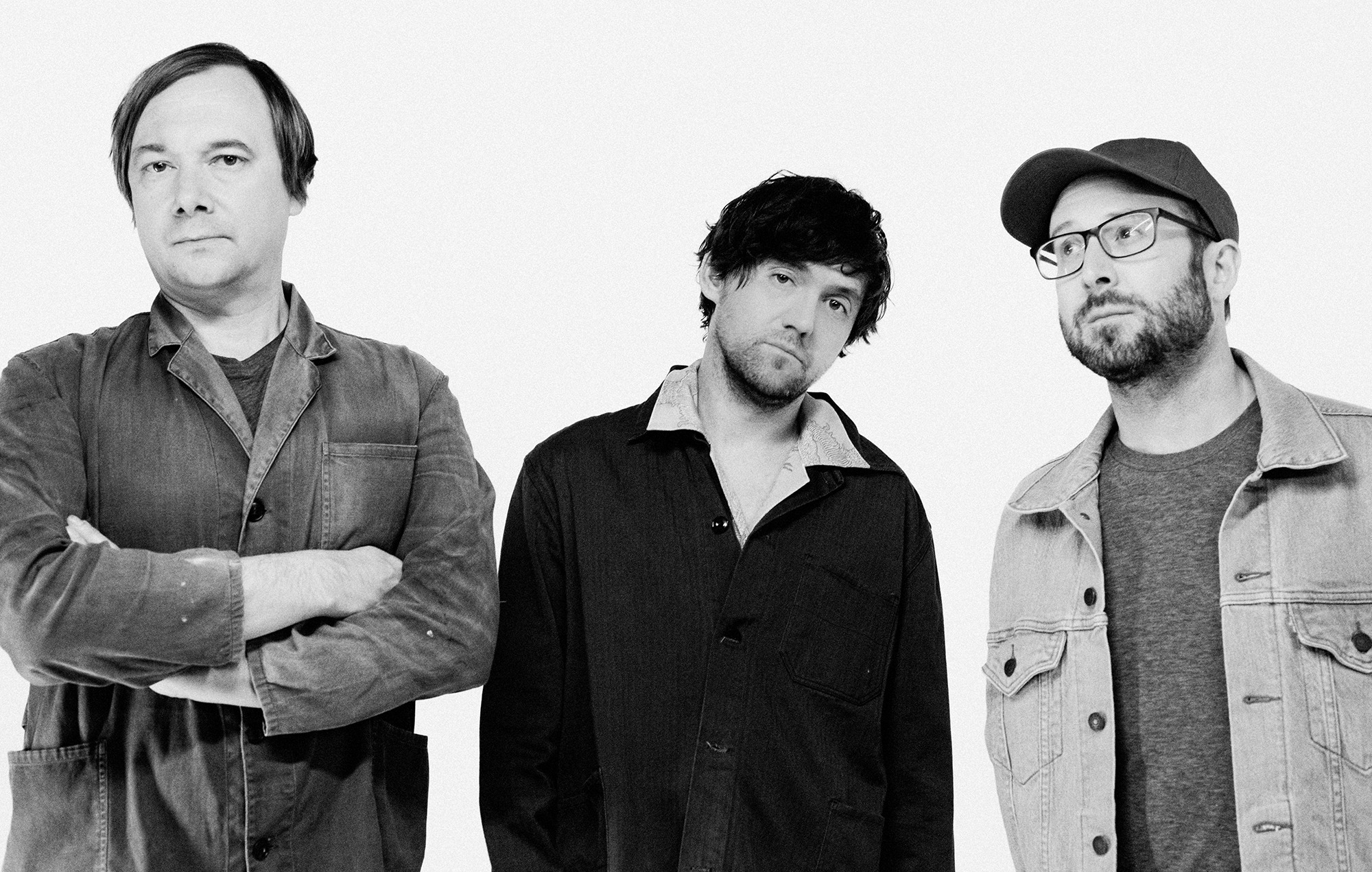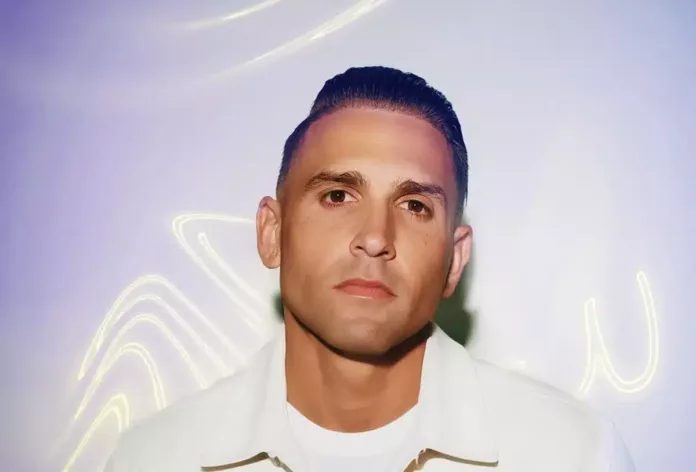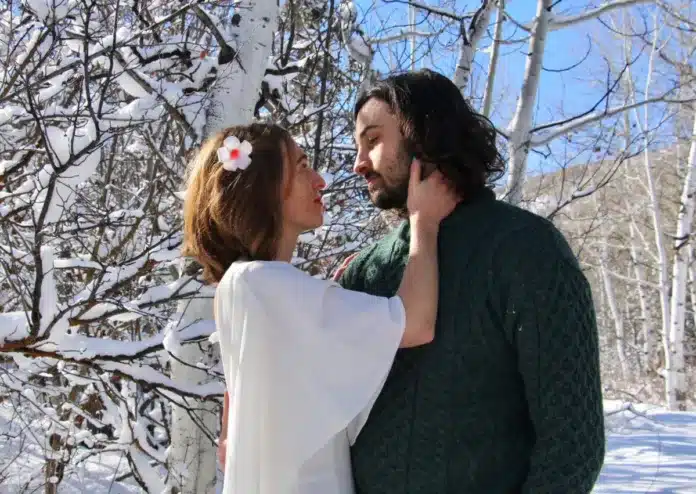
Bright Eyes: “I hope our music makes people feel less alone”
“I feel like this has happened to me way too often these days, but rest in power,” a slightly weary Conor Oberst tells NME over a Zoom call from his home in Omaha, Nebraska, ahead of his band Bright Eyes‘ new album ‘Down In The Weeds, Where The World Once Was’, their first in almost a decade.
We’re discussing a lyric from the record, specifically one that bizarrely name-checks the city of Cardiff. Having grown up in South Wales, I explain that the lyric (“If we were in Cardiff I’d just sing / But I’m stuck in Omaha obsessed with my inventions”) obviously took me aback. I joke that, perhaps much like his own Nebraska hometown, there are not that many songs that shout out the Welsh capital.
The lyric, from penultimate track ‘Calais to Dover’, was intended as a eulogy for the group’s Welsh former tour manager Simon Wring, Oberst explains. Wring, a one-time member of the band Gallon Drunk with musicians from Nick Cave’s Bad Seeds, had “travelled the world with us”, but sadly passed away in 2011. “We did some wild stuff together, and he was a really cool guy, so that verse was for him.”
‘Down In The Weeds, Where The World Once Was’ is an album that aches with loss. As Oberst told NME back in April, it’s concerned with loss “of all kinds – personal and macro amounts”. Work on the record began in 2018, two years after the death of Oberst’s older brother Matt (formerly frontman of Saddle Creek band Sorry About Dresden) and a year after Oberst separated from his wife of seven years.
Loss takes many forms on the LP. ‘Tilt-A-Whirl’ opens with a nightmarish vision, as the narrator is haunted by grief: “My phantom brother came to me / His backlit face was hard to see / I couldn’t move, I couldn’t scream”. On ‘Hot Car In The Sun’, loss is put more plainly, intertwined with the mundane as it seeps into everyday thoughts: “Chopped the celery and made the soup / Didn’t have much else to do / I was dreaming of my ex-wife’s face.”
‘Forced Convalescence’ sees Oberst address loss of health (“Forced convalescence and bed rest / Staring contest / With the ceiling and my feet”) and loss of youth (“Catastrophising my birthday / Turning forty / Ending up like everyone”), while ‘Dance and Sing’ finds the narrator envisioning their own death: “Don’t turn your cheek away / Please don’t resuscitate / Make an example out of me”.
As for the ‘macro’ part, global ills lace the lyrics. No stranger to protest anthems, Oberst has explained that he was reluctant to address a certain current US President by name. Instead, personal traumas are more acutely set to a backdrop of a world crumbling around him. ‘Mariana Trench’, the most overtly political song on the record, paints a dystopian picture of market crashes, collapsing highways and bombed-out buildings. Elsewhere, there are “bodies in the Bataclan” on ‘To Death’s Heart (In Three Parts)’ and an apocalypse approaching on closer ‘Comet Song’.
Certain lines feel especially appropriate for these times. At one point, Oberst sings: “I’ll ask my love / What will she say? / What’s it like to live with me here / Every fucking day?”. “People have said the album sounds kind of eerie, given the recent world events,” he says now. Announcing the record back in January, the band said they wanted the record to be “both an escape from, and a confrontation of, trying times”. Little did they know how pertinent their words would be.
“The human experience is terrifying and beautiful” – Conor Oberst
A little tardy to our group call with his Bright Eyes bandmates, longtime producer Mike Mogis and composer/multi-instrumentalist Nate Walcott, Oberst has seemingly just awoken, despite it being mid-afternoon local time. He has reasonable excuses, though. Of course, there’s the ongoing pandemic, which is doing a number on everybody’s concept of time, but also he was under the impression that he had the day off. In classic lockdown fashion, he kicks the interview off by double-checking what day of the week it is.
This reunion has a suitably romantic backstory: Oberst attended a Christmas party at Walcott’s Los Angeles home, where the topic of recording a new album arose. “We should do it – let’s make a record. We’re all getting older,” Oberst had told Walcott. Oberst and Walcott then huddled into a bathroom to FaceTime the Omaha-based Mogis.
Despite collaborating with each other in the intervening years though (what Mogis jokingly refers to as “work for hire” situations), all three members felt a sense of nostalgia teaming up again for the new LP. But while they sought to mine their past, they also wanted to move their sound forward.
They manage to strike that balance. ‘Stairwell Song’ brims with nostalgia, with an anguished bridge and Oberst’s heart-on-sleeve delivery that harks back to 2000’s emo-folk landmark ‘Fevers and Mirrors’. Meanwhile ‘Mariana Trench’, one of the band’s four singles released prior to the album, has the kind of stadium-rock sheen of 2011’s ‘The People’s Key’.
There are moments that take you by complete surprise too. The instrumentation has never sounded bigger – horns, strings, choirs, brass sections. And did you ever think you’d hear bagpipes on a Bright Eyes record? Well, ‘Persona Non Grata’, a song Oberst describes as a “funeral dirge”, ticks that off the bucket list.
Another thing you’d probably not expect from a Bright Eyes album: a cameo from Flea, whose unmistakable bass slaps can be heard on seven of the album’s 14 tracks. The connection came through Walcott, who knew him through a stint as a touring musician for Red Hot Chili Peppers.
“I would never have imagined that,” Oberst says. “But it happened really organically, even though it seems kind of wild as an idea… He’s a total sweetheart, and just an amazing musician – his bass part sort of becomes the hook for the songs.”
“We share a sense of freedom to move about stylistically,” Walcott says. “If we want a folky, orchestral song with maybe some slap-bass and a metal ending, we’ll try that.”

The album’s mouthful of a title comes from a personal project that Oberst was working on in the aftermath of his brother’s passing. “I wanted to make one of those old school flipbooks, ” he explains.
“You know, that you have those cartoons that run through them. I was going to have the words of this poem I was writing on each page, along with this animation of a kid pulling a horse on wheels. Then, at the end, the horse and kid would fly away. If you wanted to actually read the poem, you’d have to flip really slowly. But I kind of chickened out – I was like, ‘This is a stupid idea and I’m not a good poet’.”
Yet the poem that he was writing shared many themes that are explored on the record. As well as borrowing its title, Oberst says he used a handful of its lines as lyrics. But was working on the album as cathartic as the flipbook project sounds like it might have been?
“If we want a folky, orchestral song with slap-bass, we’ll try that” – Nate Walcott
“People like to talk about songwriting as being like therapy,” Oberst replies, taking a moment’s pause. “But I don’t know if I would put it that way, because I don’t know that it always makes me feel better.”
If not for himself, Oberst’s music has helped plenty of others over the years: a crutch for dark and trying times, songs that soundtrack whatever going on in its listeners’ lives, and shorthand for the music you put on when you’re really going through it.
“I feel very lucky that our music has meant what it has to people,” Oberst says. “I used to say that I made this stuff for ourselves, but I don’t know if that’s true. I think of it a lot differently now. Now there’s more of a desire to share it with people, to make something that’s hopefully beneficial when they listen to it. I hope it makes them feel less alone, or more connected, or just feel something. That’s part of the idea these days.”
Bright Eyes’ influence is wider than just the die-hards though. They pretty much emo icons these days, the lineage of their pensive and sensitive approach detectible in the work of some of contemporary music’s sharpest songwriters, from Phoebe Bridgers to The 1975‘s Matty Healy.
“Obviously Phoebe and I started a band together [Better Oblivion Community Center] so there’s a lot of shared sensibilities,” Oberst says. But as to what attracts many millennial musicians to their work, Oberst seems – with classic Midwestern modesty – genuinely at a loss: “I really can’t speak for them and what they see in our music.”
He does, however, recognise an unlikely link between his band and Healy’s. “I met Matty recently and he’s really cool. I don’t hear a lot in common between our bands, but what I like about them is that they’re also weirdly genre-less. They have radio-pop songs, then others sound like a punk-rock band. It confuses me, but I like that. They’re willing to be many different bands in one. I think we probably have that in common.”

Perhaps more surprising is the number of hip-hop acts lining up to co-sign Bright Eyes. Post Malone has said that Oberst not only inspired his trembling singing style, but that he used to “cry his fucking eyes out” to their 2005 classic album ‘I’m Wide Awake, It’s Morning’. “He’s actually a really sweet guy,” says Walcott.
Post Malone interpolated ‘First Day Of My Life’ on the 2017 Young Thug track ‘Me Or Us’, while the late Mac Miller covered Bright Eyes classic ‘Lua’. Yet Oberst says it’s Lil Peep’s sample of ‘Something Vague’, on the 2016 track ‘Worlds Away’, that sticks most in his memory.
“He took this acoustic chord progression that I played in a basement [years ago] and turned it into this totally different musical experience,” Oberst notes. “I think it’s really cool that [rappers] are open-minded and can re-contextualise things in ways that I could never have guessed to do.” Mogis chimes in to joke: “Maybe he lost a bet. Like someone said, ‘There’s no way you could make a hip-hop song out of this’.”
On many of Oberst’s recent solo tracks, there’s been an uneasy but palpable sense of bitterness – no more so than on ‘No One Changes’, in which he almost snarls the lines, “Yes, I sleep at that fucking whore’s house now… / No one’s gonna change / Nobody ever does / And I’m never gonna do what you want me to.”
For all the loss, grief and trauma at the heart of the new record, though, it’s less bleak; there are more glimmers of hope in the darkness. “Got to keep on going like it ain’t the end / Got to change like your life is depending on it,” Oberst sings in his opening lyrics to the album, as if accepting of life’s strife. On closer ‘Comet Song’ he finds solace in sought in minutiae: “There’s tulips in the wheelbarrow / There’s cherries in the tree / There’s a comet in the sky at least / One night a century.”
“I think it’s about the juxtaposition that we all find ourselves in,” Oberst says. “The human experience is what it is. It’s terrifying and it’s beautiful. There’s all the highs and lows that goes into being alive. Nothing is really unique to me. If this is the way that I’m going through life then there’s probably a lot of other people that are having a similar experience – love and death and all the middle ground.”

At the end of our chat, as is almost obligatory in these times, I ask whether the band have been keeping busy during lockdown. After all, it must feel strange to finish a record and then suddenly have ample amounts of spare time, rather than taking it on tour. While Mogis and Walcott have been working on a TV score (ironically, it’s for a show about a pandemic), Oberst says he’s had very little motivation.
“It’s hard for me to take a shower or boil an egg,” he admits. “I haven’t felt like doing anything. I’ve been wearing the same clothes for like three days – I’ll take a shower today, I swear. It’s just hard to really care about anything.” The band recently confirmed plans for another new album, though, and Mogis interrupts Oberst to tease: “Maybe we’ll make some more music after this pandemic.”
Bright Eyes’ new album ‘Down In The Weeds, Where The World Once Was’ is out on Friday 21 August




